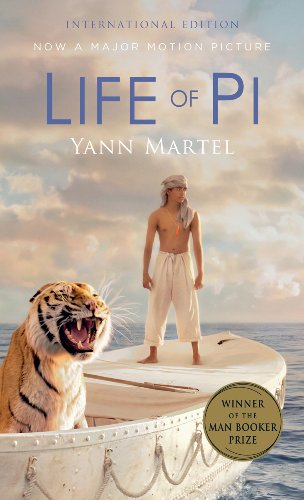Synopsis:
Winner of the 2002 Man Booker Prize for Fiction
Pi Patel is an unusual boy. The son of a zookeeper, he has an encyclopedic knowledge of animal behavior, a fervent love of stories, and practices not only his native Hinduism, but also Christianity and Islam. When Pi is sixteen, his family emigrates from India to North America aboard a Japanese cargo ship, along with their zoo animals bound for new homes. The ship sinks. Pi finds himself alone in a lifeboat, his only companions a hyena, an orangutan, a wounded zebra, and Richard Parker, a 450-pound Bengal tiger. Soon the tiger has dispatched all but Pi, whose fear, knowledge, and cunning allow him to coexist with Richard Parker for 227 days lost at sea. When they finally reach the coast of Mexico, Richard Parker flees to the jungle, never to be seen again. The Japanese authorities who interrogate Pi refuse to believe his story and press him to tell them "the truth." After hours of coercion, Pi tells a second story, a story much less fantastical, much more conventional-but is it more true?
Life of Pi is at once a realistic, rousing adventure and a meta-tale of survival that explores the redemptive power of storytelling and the transformative nature of fiction. It's a story, as one character puts it, to make you believe in God.
Review:
Some books defy categorisation: Life of Pi, the second novel from Canadian writer Yann Martel, is a case in point: just about the only thing you can say for certain about it is that it is fiercely and admirably unique. The plot, if that’s the right word, concerns the oceanic wanderings of a lost boy, the young and eager Piscine Patel of the title (Pi). After a colourful and loving upbringing in gorgeously-hued India, the Muslim-Christian-animistic Pi sets off for a fresh start in Canada. His blissful voyage is rudely interrupted when his boat is scuppered halfway across the Pacific, and he is forced to rough it in a lifeboat with a hyena, a monkey, a whingeing zebra and a tiger called Richard. That would be bad enough, but from here on things get weirder: the animals start slaughtering each other in a veritable frenzy of allegorical bloodlust, until Richard the tiger and Pi are left alone to wander the wastes of ocean, with plenty of time to ponder their fate, the cruelty of the gods, the best way to handle storms and the various different recipes for oothappam, scrapple and coconut yam kootu. The denouement is pleasantly neat. According to the blurb, thirtysomething Yann Martel spent long years in Alaska, India, Mexico, France, Costa Rica, Turkey and Iran, before settling in Canada. All those cultures and more have been poured into this spicy, vivacious, kinetic and very entertaining fiction. --Sean Thomas
"About this title" may belong to another edition of this title.
![]()
